| Srl | Item |
| 1 |
ID:
108976
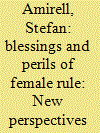

|
|
|
|
|
| Publication |
2011.
|
| Summary/Abstract |
Only in a handful of cases in world history has female rule been seen by contemporary observers as desirable and been sustained for long periods of time. Drawing on European, Malay and Chinese sources, this article investigates the reasons for the institutionalisation of female rule in the Malay sultanate of Patani (presently in southern Thailand) for most of the period between c. 1584 and 1711. It is concluded that the results of previous research, in which the Patani queens are characterised as powerless front figures and/or promiscuous, have insufficient support in the contemporary sources. Furthermore, the problems of female rule for dynastic stability are discussed comparatively. Finally, the decline of female rule in Patani after the mid-seventeenth century is explained with reference to the larger political, economic and military changes in maritime Southeast Asia at the time.
|
|
|
|
|
|
|
|
|
|
|
|
|
|
|
|
| 2 |
ID:
097799
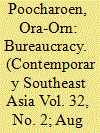

|
|
|
| 3 |
ID:
166804
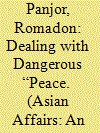

|
|
|
|
|
| Summary/Abstract |
The deadly ethno-political conflict in the Deep South of Thailand or “Patani” corresponds with problematic issues regarding the presence or absence of certain terminology. In other words, the naming of violent situations, actors, the territory/land and the people, including the way in which these conflicts have been transformed, remains contested. This chapter elaborates upon the semantic dynamic of such naming by means of “unfolding” to present times how these contested words and concepts could shape conflict and the peace process and how peace communities should deal with confronting the political convenience of accepting a term such as “armed conflict” and the difference between Thai terms such as “santipap” and “santisuk” which both seem to mean “peace” in this conflict.
|
|
|
|
|
|
|
|
|
|
|
|
|
|
|
|
| 4 |
ID:
183459
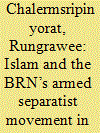

|
|
|
|
|
| Summary/Abstract |
This article examines the roles of religion in the contemporary separatist movement in southern Thailand, whose violent campaigns have dramatically surged since 2004. It locates Islam in the region’s own political and historical context rather than viewing it as an expression of transnational terrorism or casting Islam as of secondary importance in what is seen as primarily an ethno-nationalist struggle, as some scholars have done. I argue that Islam served as a powerful motivational frame that drove thousands of Malay Muslims to take part in the violent struggle led by the Patani Malay National Revolutionary Front (BRN), as a sacred justification for their violent actions and as a blueprint of a new socio-political order. The conflict was elevated into a cosmological battle and the fighters’ actions were fundamentally framed within Islamic theology. Islamic law was employed as a primary reference for the justification and regulation of violent attacks. This article also demonstrates that Islam is part of the BRN’s political agenda and fighters have turned their perceived Islamic beliefs and norms into military actions. However, its ideological orientation is at variance with that of the transnational jihadists. This article offers a more nuanced approach to understanding the religious dimensions of this conflict.
|
|
|
|
|
|
|
|
|
|
|
|
|
|
|
|
| 5 |
ID:
180643
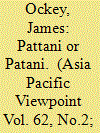

|
|
|
|
|
| Summary/Abstract |
The conflict in Southern Thailand has claimed over 7000 lives in the last 15 years, with no end it sight. The Thai state has consistently misinterpreted both the causes and the solutions to the problems. This article seeks to identify one cause for the conflict, through examining identity in the south through the lenses of collective memory and forgetting. By focusing on young activists at university, it demonstrates the ways that collective memory is generated through shared pilgrimages to sacred places, and shared activities in the pursuit of peace. It also explores the ways that shared memory is both created through debate, through sharing and even through hate speech on the internet, and discusses the ways that social media debates deepen collective memory in oppositional and dangerous ways. Finally, the article argues that until a place is found for local collective memories of Patani in the Thai national collective memory, long-term peace will be impossible.
|
|
|
|
|
|
|
|
|
|
|
|
|
|
|
|
| 6 |
ID:
103795
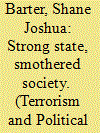

|
|
|
|
|
| Publication |
2011.
|
| Summary/Abstract |
Why have militants in southern Thailand utilized anonymous and at times indiscriminate terrorist violence against civilians? This article gauges three explanations: resource wealth, weak states, and strong states. I argue that terrorist violence against civilians in southern Thailand is partially sustained and largely structured by the considerable institutional strength of the Thai state. This helps sustain the conflict by providing an additional grievance and it structures the form of violence by forcing militants underground and severing their links to civilians. A potential response would be to trim state agencies and scale back the presence of the state in Patani.
|
|
|
|
|
|
|
|
|
|
|
|
|
|
|
|